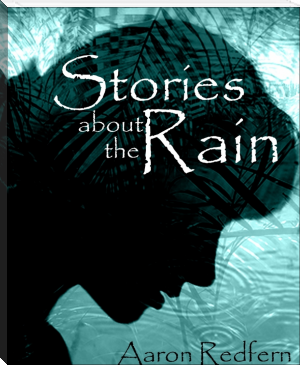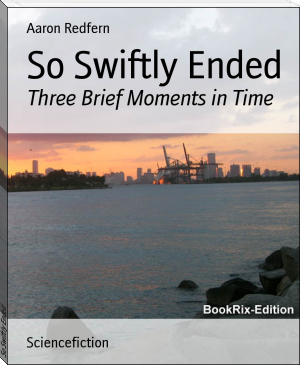Stories About the Rain by Aaron Redfern (best business books of all time .TXT) 📖

- Author: Aaron Redfern
Book online «Stories About the Rain by Aaron Redfern (best business books of all time .TXT) 📖». Author Aaron Redfern
I remember her best as a brightness: a splash of amber against the rain, wet and blurred, her hair pulled up in the imagined style of a dead people. It always rains on Papho, drip-mists and drobbles taking turns like gentle rocking waves, a pulse that becomes a way of life, rising in crescendo to the terror of the summer monsoons. They say that the new natives have a hundred different words for rain, but the truth is simply that they have many ways of expressing what they feel.
The flowering plants on Papho are crevice-huggers. They cling to the sides of things, wind their way up the trunks of trees, climb the faces of cliffs. Their vines are as thick as arms. Two or three individual leaves, unrolled and sewn together, can be made into blankets. The flowers that bloom on them are big enough to curl up inside. Each surface is waxy and waterproof, each contour of the plant designed to guide water where it is needed and dismiss it from where it is not. Like all living things, their workings are complex and mostly unseen. You can describe them in as many words as you like, but they have no explanation.
The people who live on the planet wear clothing made from the leaves to keep the water off, but almost every time I saw her she had decked herself in the petals, and her form was traced underneath their wrapping. She liked the gold ones, the amber, the tangerine, the ochre. Once I saw her wear red, but I think that she was only trying it on. She only wore them when she was alone, or with me. I do not know if it was a habit she kept secret from the other settlers, and I never spoke of it to them.
It always rains on Papho. The continents are honey- combs of straits and seas; wind from off of the water is omnipresent. The tropics are cool enough to condense the vapors, and the habitable land is carpeted with jungle that gives up its own constant moisture. The skies are perennially gray, and the mists mute the scenery and obscure the horizons. It is hard not to see the mood as somber. Where there is color, it stands out intensely.
“You know the face of God when you see it, Ev,” she said to me once. “A holy thing is a thing you see and know that you will never be able to take it for granted. Not ever.” She was standing next to me on the rocks. Stray locks of her hair trailed down her face and channeled the drops, and water ran off of her petals.
There are places on that planet where immense pits have been burrowed into the rocky ground by the pounding and shifting of old flows of water, now redirected. You can stand at the top and look down so far that the rain seems to funnel toward a point shrouded in darkness, past the roughness of the rocks and the clinging vines with their huge flowers and deep down into spaces you cannot fathom or see, but only imagine. There is one such chasm which the settlers call Orakku, not far from the village, a hundred feet across and nearly a mile deep. She had taken me there.
Later, I remember watching her far below as she climbed, a splash of amber clinging to the side of Orakku, complex, unexplained.
* * *
The place where the Reclaimer
had landed was an oddity, a shelf of flat rock a third of a mile long. It barely seated the mass of the ship, the land to three sides falling away into fractured tumbles and dense forestation, and pitching upward in pillar-like formations on the fourth. I remember the ride; there was none of the grating and jostling we braced ourselves for, just the crunching impact of touch- down. And then, after, the smell of steam and charred wood and the burnt odors of plants like none we had known before. The ship’s gunners had to scorch away some of the jungle to make a place to land. Eden
must have had to do the same, seventy years before, but the new natives don’t like to talk about their beginnings.
They burned away the jungle that first day, and they have been forced to do so continually. The plants grow incredibly quickly on Papho when there is new space to be had. So it was within the last tendrils of dissipating steam and the faint traces of that well-remembered smell that I found Will -- Captain William Mantego, commander of the Reclaimer
and tracker of human habitation through the stars -- standing in the shelter of his ship with the ramp down, calling out orders as crates of plant samples were hauled up. He was in full uniform, even the cap, weather be damned, and I wondered briefly if he was the same man I had raced on shiftbike through the canyons years ago on Little Norva.
Stepping up from the lower slopes and feeling the rain suddenly cease as I passed under the rim of the ship was like walking into another world.
He smiled briefly when he saw me, but held his official stance, arms crossed in front of him, legs firmly planted. “Any luck?”
“That depends,” I said, “on what you’d say our mission is.”
“I take it no one is jumping at the chance to come back with us, then,” Will said.
I shrugged. “They like it here, I guess. They like being where they are.”
“They always do.” He turned to shout a command over his shoulder at the haulers, then walked past me toward the edge of the shelf, looking out through the sheet of rain. “You have heard it as many times as I have, and we’ve been on a few of these missions now. Every Reclamation is the same. Every population anchors itself to its planet; it doesn’t matter whether they were stranded or chose to settle. They come, they face terrible hardship, stranger and tougher than anything they’ve ever known, and it changes them. The hell they’ve been through, they take it and store it inside them, make it a part of themselves. They become a part of the planet, as though they had always been there. You can’t get them to leave.”
“At least they haven’t dismissed us outright, like the people on Preta,” I said. “They talk to us. They’ve been generous. I think they enjoy our company.”
“Their cooperation has been helpful.” His voice was hard and edged. That was the Captain’s tone, purged of feeling, but I knew him well enough to hear his frustration.
“Maybe that’s all we can ask of them,” I said. “Their great grandparents may have been born to our way of life, but they weren’t. It could be for the best.”
“Is that your professional opinion?” the Captain said.
“No,” I said. “I don’t have one yet. Give me some more time.”
“We still have a month here,” he said. He didn’t look at me; his eyes scanned across the treetops and back again. “Ev, promise me one thing. Promise me you will convince some of them. No one has ever Re- claimed anyone -- not without excessive force and a court martial. No one has ever been brought home. Humankind is spreading too far, and it isn’t looking back. I want that first sign that we can unite. We’re one species. We aren’t meant to be fractured like this.”
“I will try,” I said, and I do not know if he heard me over the pounding of the rain. I granted him the right to have his dream, because he was my captain and my greatest friend, and I told it to the wind and the water that no matter how much we had grown apart from each other, I would try.
* * *
Papho is a beautiful place. There are planets made of ice and planets covered by desert and planets where the atmosphere is poison gas, planets where all life has failed and planets where nothing has ever lived, and since there is a kind of beauty to be found in suffering and in vast emptiness, each of them has a kind of beauty. But Papho is like Earth. Though it is choked with water and most of the planet is cold, the equatorial zones harbor the right climate for life. Thousands of plant species, hundreds of fungi, and a handful of small animals have found ways to thrive. It is as eerily familiar as it is unlikely. In the early days after our arrival, when we still knew little, we used to wonder if there had ever been an intelligent species like us.
She would often take me into the treetops when the rain was light. Her people wear a sort of hand- wrapping, made from the rock-grabbing roots of the great flowering plants, which they use to climb, and she would slither up the trunks with incredible grace. I followed with my own hands engulfed in a borrowed pair, clumsily. I had no education in such things.
Near the top, she would straddle one of the great branches, far enough out so that I could not help my fear for her, that the branch might bend and shrug her off, or that she would slip on the wet surface and plummet to the rocks. But she moved with a perfect knowledge, taking the dangers for granted.
Up there--she always chose the tallest trees--we could see across the top of the jungle, the canopy like a moving, living floor. We could see the hewn planet, the columnar rock formations, the short sheer cliff faces, the arches of stone. You’ve never seen natural sculpture like on Papho; the forces of erosion are constant and forever shifting. And always there would be Orakku, heard if not seen, a klick to the south or half a klick east or a hundred yards north. She had many havens, but the titanic cavern shaft was always there, somewhere.
“No one person could ever map the jungle,” she said, “Not even in their heart, where knowing goes deeper. No one could ever know the whole of it. It goes on and on, past everything I will ever be able to see.”
“Can you learn so much from trees?” I said. It was only half a joke.
“We all love the trees." She was leaning forward across the branch, arms laid out in front of her to keep her steady. “I don‘t think that I could ever do without the trees. Or without the rain.”
It ran down her arms, the rainwater. It slid from her matted hair and followed the skin of her neck. It rolled across the petals that contained her breasts. It dripped from her toes and became the rain again, falling to the undergrowth.





Comments (0)